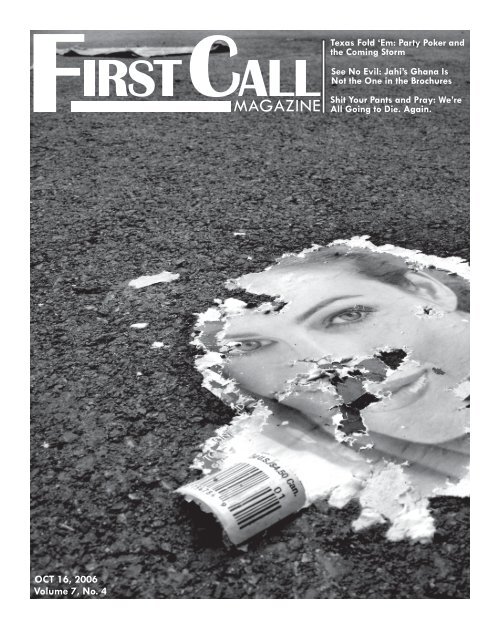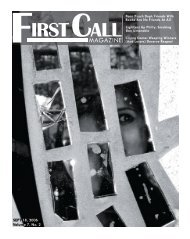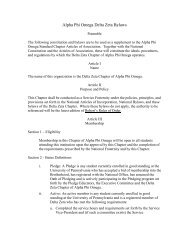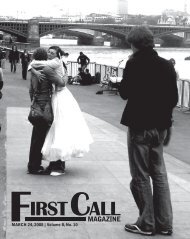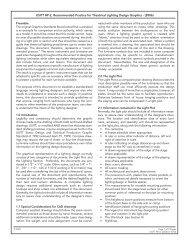October 16, 2006 - University of Pennsylvania
October 16, 2006 - University of Pennsylvania
October 16, 2006 - University of Pennsylvania
- No tags were found...
Create successful ePaper yourself
Turn your PDF publications into a flip-book with our unique Google optimized e-Paper software.
longer deniable.Never mind that North Korea’sintercontinental missile fizzled, thatthe suspects in the New York andCanadian plots had been monitoredfor months and years, respectively,that Israel has waged wars against itsallied neighbors half a dozen timesover its short history, that the threatto the “civilized world” from Islamicterrorism is nothing compared tothe Cold War’s constant threat <strong>of</strong>nuclear war that could have easilybeen triggered by a technical glitch ora misinterpreted action.“Dude,” as Jon Stewart said aboutsuch doom-saying. “Get real.”Todays threat’s – whether fromIslamism and the Middle East, ABC’swandering black holes, or “Jericho”’smysterious atomic bombs, arecomparably miniscule. Why does themedia so actively promote – glorify,even – death and destruction? Onlybecause we lap it up: we are suckersfor the end <strong>of</strong> the world.And we’ve been that way for along time. In 1898, H.G. Wells wrote“The War <strong>of</strong> the Worlds,” detailinga calamitous Martian invasion <strong>of</strong>Earth. In 1938, when Orson Wellesbroadcast an adaptation <strong>of</strong> the novelon the radio, millions <strong>of</strong> peopledeliriously believed in the fiction. Adecade later, when an Ecuador radiostation broadcast a translated version<strong>of</strong> the same story, mass panic similarlyensued; when the station franticallyclarified to its audience that the alieninvasion was fictional, mobs set fireto the station and the <strong>of</strong>fices <strong>of</strong> theleading newspaper, killing 20 people.Steven Spielberg’s 2005 adaptationearned almost $600 million at theglobal box <strong>of</strong>fice, despite star TomCruise’s couch-jumping.Alien invasion isn’t the onlyapocalyptic scenario we flock to.From Mary Shelley’s 1826 followupto Frankenstein, The Last Man,to Danny Boyle’s 2002 horror film28 Days Later, pandemics haverepeatedly been used in fiction to kill<strong>of</strong>f civilization. The machines come torule us in works as varied as Jean-LucGodard’s Alphaville to the Wachowskibrothers’ Matrix trilogy. Ecologicalcatastrophe causes a near-apocalypsein everything from Cat’s Cradle to TheDay After Tomorrow. The Bible itselfends with the juiciest <strong>of</strong> apocalypses,the Book <strong>of</strong> Revelation; today, the LeftBehind series dumbs it down for themasses.After every failed media scare– killer bees in the 80s, Y2K in 90s– we refuse to learn our lesson. Thenext one is real, we say; this onesounds plausible. As the saying goes,every prediction <strong>of</strong> the end <strong>of</strong> theworld is always wrong, except for thelast one. The media hypes potentialcatastrophes only because we alreadylove them – we’ve read the books,seen the movies, believed the radioFIRST CALL OCTOBER <strong>16</strong>, <strong>2006</strong>
oadcasts, and now we want to see itcome to life. It is the end <strong>of</strong> the worldas we know it, to use the most obviouspop culture reference, and we do feelfine. The question is, why?Kurt Anderson recently wrote inNew York magazine about this verytopic. He notes that Harvard historianNiall Ferguson compares Americain <strong>2006</strong> to ancient Rome just beforeits collapse, Cormac McCarthy’snewest novel, The Road, leaves the oldWest behind for a post-nuclear-warwasteland, and Mel Gibson, who madehis name as Mad Max, is set to releasethe film Apocalypto, about the fall <strong>of</strong>the Mayan civilization. “Apocalypseis on our minds,” Anderson writes.“Apocalypse is … hot.” Indeed it is, butagain, why?Ultimately, I think, we loveapocalyptic destruction becausewe hate society. Truthfully. Only alittle bit, <strong>of</strong> course, because most <strong>of</strong>us aren’t traveling to Iraq to set <strong>of</strong>fIEDs, or smuggling dirty bombsover the Canadian border. It is, atits base, escapism: we are sick <strong>of</strong> oursleazy politicians, our socioeconomicimbalances, our societal constrictions.We yearn to tear society down andlive anew, in the ultra-libertarianwasteland <strong>of</strong> the post-apocalypse,where we can loot stores and killstrangers and have no consequencefor our actions.But then we come back from theemotional high <strong>of</strong> bloodlust and werecognize intellectually that in chaos,we are more likely to be the strangerkilled than the killer <strong>of</strong> strangers.Society’s constructs lift us up morethan they hold us down. And, most <strong>of</strong>all, for that post-apocalyptic situationto come about, almost all <strong>of</strong> us haveto die – and by statistical probability,we are almost surely to be among the“almost all <strong>of</strong> us.” Better to live todaythan to die tomorrow.Remember the opening <strong>of</strong>“Jericho,” with the little girl countingdown to zero just as a nuclear bombgoes <strong>of</strong>f? It’s a hint back to the 1964LBJ-Barry Goldwater presidentialcampaign, when a famous ad showeda little girl counting the petals on adaisy before picking them <strong>of</strong>f – andthen, as the camera zooms at her pupil,a nuclear bomb explodes. “These arethe stakes,” the narrator says. “To makea world in which all <strong>of</strong> God’s childrencan live, or to go into the dark. Wemust either love each other, or wemust die. Vote for President Johnsonon November 3.”This is the ultimate attack ad,sleaziness beyond boundary. Johnsonessentially accuses Goldwater <strong>of</strong> beingthe cause <strong>of</strong> future nuclear war andthe killer <strong>of</strong> cute, innocent children.We are repulsed – the ad only ranonce because <strong>of</strong> protests, but the pointsticks. Only an actual apocalypsecould bring down the vileness <strong>of</strong> thewe come back from the emotional high <strong>of</strong>bloodlust and we recognize intellectuallythat in chaos, we are more likely to be thestranger killed than the killer <strong>of</strong> strangerstype <strong>of</strong> people who would create, film,and run such an advertisement.Such an apocalypse is displayed in28 Days Later, perhaps the best postapocalypticmovie made in decades.Cillian Murphy wanders emptyLondon streets after a pandemicturns most <strong>of</strong> the population intozombie-like raging killers. To escapethe infected, Murphy’s characterand a few <strong>of</strong> the people he meets fleenorth. In the most spontaneouslyjoyful scene <strong>of</strong> the movie, our heroesenter an empty supermarket andfill countless shopping carts with allthe supplies they need, while upbeatelectro-pop plays on the soundtrack.Then, at the checkout counter, theymockingly leave a credit card to payfor their loot. The scene portraysexactly the wanton joy an apocalypseprovides. But the movie takes a darkturn; the characters head north to alone military outpost that turns outto be anything but the refuge they hadhoped for. Society’s destruction turnshumans into savages, and directorDanny Boyle uses the military outpostas a wicked and horrifying satire onhuman nature and social constructs. Iwon’t give away the ending, but sufficeto say, the apocalypse in all its glory isnot very enticing.And this is the common theme:for all the reckless, joyful abandon <strong>of</strong>the fictional apocalypse, the negativeaspects <strong>of</strong> destruction – in the end– always outweigh the positive. Everymovie or book always ends either witha return to civilization (the suddenalien deaths in War <strong>of</strong> the Worlds andthe plane flying in 28 Days Later, forexample) or, alternately – and morerarely – a bleak, barren wasteland(the end <strong>of</strong> Cat’s Cradle, for example)that puts to rest any idle fantasiesabout the joys <strong>of</strong> destruction. For allthe ultra-libertarian longing for chaos,the lust for the apocalypse ultimatelyarises from the most conservative <strong>of</strong>instincts – a desire for reassurancethat life is good, chaos will not arise,and everything will be okay in theend.I, however, can never be so sure, soI’ll leave you with this: On September26, 1983, alarms went <strong>of</strong>f as thecomputers in a bunker near Moscowsaid that US missiles were headed tothe Soviet Union. Stanislav Petrov,the Russian <strong>of</strong>ficer on duty, had twooptions: do nothing, and risk lettingthe five missiles hit Russian citiesand kill – for all he knew – perhapshundreds <strong>of</strong> millions; or, report a USmissile strike and order a return <strong>of</strong>fire, risking hundreds <strong>of</strong> millions <strong>of</strong>lives for what could be merely a falsealarm.It must have taken balls <strong>of</strong>plutonium, but Petrov held hisground, trusted that the US wouldn’tstart a nuclear war, and didn’t reportthe missiles. It was a false alarm, <strong>of</strong>course, and Petrov had, more or less,saved the world. Still, the incidentrevealed flaws in the Soviet militarystructure, and Petrov was turned intoa scapegoat; his promising militarycareer quickly ended. We came very,very close to a nuclear holocaust – and,<strong>of</strong> all people, the hero was blamed. Sosit back and relax, heroes and villains:if the world ends, c’est la vie; if we’restill here and you work for the Russiangovernment, do think twice beforepushing the wrong button. FCIsaac Katz is a sophomore in the College.You can write to him at isaachk@sas. FIRST CALL OCTOBER <strong>16</strong>, <strong>2006</strong>
Black Holes and IKea smashersmuse’s new album and the swedish death metal <strong>of</strong> opethdoug MooreMuse has always been all aboutthe grand design, even when itdoesn’t seem to make a whole lot <strong>of</strong>sense to the listener. Rarely has thisbeen truer than on Black Holes andRevelations, which is the British act’smost elaborate and scattershot albumto date. Muse’s execution here isabsolutely true to form: epic in scale,exacting in performance and drippingwith eyes-to-the-sky drama to thepoint <strong>of</strong> parody. However, they’veexpanded their repertoire with a fewtoo many disorienting stylistic sleight<strong>of</strong>-handsfor comfort.Most obvious is Muse’s bizarrechoice for Black Holes and Revelations’lead single. “Supermassive Black Hole”has no more elaborate studio trickerythan most Muse tracks, but the glitzand polish here goes to produce a sort<strong>of</strong> eighties sleaze-funk anthem thatwill likely skeeve out as many peopleas it turns on. Similarly, “Map <strong>of</strong> theProblematique” casts slightly tranceysheen on Matt Bellamy’s roboticguitars and plaintive vocals, and thesong’s structure ultimately bucklesunder the weight <strong>of</strong> the disparatestyles. The results are interesting inthe context <strong>of</strong> their back catalogue butare a smidge too ridiculous to makefor particularly good listening.But it’s hard not to love Musewhen they do hit home. “Starlight”and “Take a Bow” see the bandsummoning up sweeping pathos ontwo <strong>of</strong> their favorite subjects—loveand condemnation—and supportingit gorgeously with skyscraper chorusesand glistening synth arpeggios.Though they never quite muster theinfectious hard rock fury that drovethe excellent “Stockholm Syndrome”from 2004’s Absolution, “Assassin”and “Exo-Politics” allow DominicHoward to flex his rock-hero skinsmanmuscles and Bellamy to breakout some <strong>of</strong> his punchier riffing. By thetime that the closing trifecta <strong>of</strong> “City <strong>of</strong>Delusion,” “Hoodoo” and “Knights <strong>of</strong>Cydonia” roll around, most listenerswill be too involved to care about thesongs’ slight bloating and indulgentnature. Black Holes and Revelations,for all <strong>of</strong> its extra ambitions andconfounding style-hopping, is stilla satisfying, engrossing experiencethat’ll satiate most listeners.Opeth: Live at the Trocadero(<strong>October</strong> 3 rd )Opeth are something <strong>of</strong> a paradox.With their expansive prog-metal style,they’re not exactly easy on the ears,and yet the band has come as closeto a household name as any act evenremotely related to death metal canget. Opeth owe their relative fame inlarge part to the dulcet vocal melodiesand artful guitar leads <strong>of</strong> frontmanMikael Akerfeldt, whose deadpanstage raps and spot-on delivery havebeen lighting up arena-sized venuesnightly as part <strong>of</strong> Dave (Megadeth)Mustaine’s Gigantour package. Likeany good metal band, though, Opethis still very much driven by their corefan base, and they proved it with ashowcase <strong>of</strong> older material on <strong>October</strong>3 rd at the (comparably intimate)Trocadero.The show was technically an <strong>of</strong>fpackagedate with Gigantour matesArch Enemy and Sanctity, but therewas no question that Opeth was theprime draw. The two openers evokedthe usual displays <strong>of</strong> moshing andheadbanging from the largely blackcladattendees, but the crowd exudedlittle pre-rock-out tension until justbefore Opeth’s set. Some <strong>of</strong> the band’solder fans would have been intriguedby the decidedly diverse audience.Though there were plenty <strong>of</strong>longhaired elder metalheads, Opeth’snewfound popularity also drew in ayoung and more colorful element.Many <strong>of</strong> these new fans, onlyfamiliar with Opeth’s last two or threealbums, were likely disappointed bythe band’s set. It was a paradise fordiehards, though, as Akerfeldt andcompany plowed through a set heavywith rarities and old favorites. Onlytwo tracks from the wildly successfulGhost Reveries made it into the set(“Ghost <strong>of</strong> Perdition” and “The GrandConjuration”), and they were largelyoutshone by the rousing renditions<strong>of</strong> classics like “The Leper Affinity”and “Deliverance.” Drummer MartinAxenrot will always have big shoesto fill, and fans will likely alwaysmiss masterful ex-drummer MartinLopez, but Axenrot’s performancewas spot on for virtually the wholenight. Especially noteworthy was hisshowing on live rarity but perennialfan favorite “Godhead’s Lament,” evenin the face <strong>of</strong> Akerfeldt’s commandingchorus. The real treat <strong>of</strong> the night wasa virtually unheard-<strong>of</strong> performance<strong>of</strong> “Under the Weeping Moon” fromOpeth’s debut Orchid album. Thetrudging, thick nature <strong>of</strong> the song mayhave unnerved fans more used to theirrecent progressive meanderings, butOpeth’s devastating delivery provedtheir refusal to deviate entirely fromtheir roots.The set length was relativelyshort, but by the time Opeth hadrocked the Troc with encore crusher“Demon <strong>of</strong> the Fall,” the vast majority<strong>of</strong> the crowd was drained by theeffort <strong>of</strong> absorbing the performance.Tuesday’s show was one <strong>of</strong> the last liveOpeth performances this side <strong>of</strong> theirnative Sweden for some time to come,as the band is resting and preparing torecord a new album. For an act that’sbeen on the road for almost eighteenmonths, Opeth gave a remarkablygood account <strong>of</strong> themselves to ahungry crowd. FCDoug Moore is a freshman in the College.You can write to him at motdoug@sas.FIRST CALL OCTOBER <strong>16</strong>, <strong>2006</strong>
Royal Flushthe congressional plot to destroy online pokerI’ve never played poker before.Sure, I sat on my boyfriend’s lap inhigh school while he played in hisfriend’s basement and asked me formy advice so I could feel included, butthat doesn’t count. The only gamblingI’ve ever done has been on a cruiseship one time, in my room, on the TV.Blackjack. I lost ten dollars.Why, then, am I writing an articleon internet poker? Well, aside from thefact that anything the religious rightis against tends to make for worthynews fodder, apparently lots <strong>of</strong> peopledo play it. As in millions <strong>of</strong> people, inand around the 18-35 demographic,from their homes, apartments anddorm rooms. I’m talking 11,500,000hits on Google for “poker.” Don’tworry, there were 117,000,000 for“porn” – Americans aren’t losingtheir mojos over a game. (By the way-- 1,410,000,000 for “love.” Makes agirl’s heart melt.) Clearly poker is aglobal phenomenon. But as <strong>of</strong> a coupleweeks ago, they’re not too happy.Before I address their concerns, aword on the history <strong>of</strong> the phenomenonitself.Online poker is relatively new,starting in 1998 with the site PlanetPoker, and then hitting it big in2001 with the introduction <strong>of</strong> othermajor sites, including PartyPoker,PokerStars and UltimateBet. In 2003,poker hit mainstream television, withthe World Poker Tour debuting onthe Travel Channel and the annualWorld Series <strong>of</strong> Poker on ESPN, aswell as many other poker-themedshows, which ushered in a huge rise inmass popularity, both online and <strong>of</strong>f.Today online poker is a game playedby pr<strong>of</strong>essionals and amateurs alike:businessmen with too much to lose,college kids with too much to gain andeveryone in between who just enjoysthe game.But the honeymoon may now beover. That’s because there are somein this country who oppose the rightto play and are now starting to dosomething about it. Whether you’reagainst gambling or not, whether youthink it’s moral or not and whether ornot you care at all, this whole debateover the legality <strong>of</strong> online poker isactually pretty interesting. And this iscoming from a girl who thinks cardsare way more fun to build castles withthan anything else – trust me on thisone and hear me out before you run<strong>of</strong>f to your underage drinking bingefest.The current controversy revolvesaround a bill that passed throughCongress about a week ago, whichmakes it a crime for a bank or financialinstitution to transfer money to anonline gambling site, essentially aban for online poker in the US, sincemost sites and intermediary bankingaccounts will no longer transfertheir money. The Unlawful InternetGambling Enforcement Act is titleVIII <strong>of</strong> a completely unrelated bill,the Safe Port Act and was pushedthrough Congress by the Republicanleadership in the final minutes beforethe election period recess. All it needsnow is Dubya’s signature on thebottom.To clarify: online poker is notillegal. Neither are online horsebettingor online fantasy sportsbetting (provided the sites includesome players who are really made up.Great rule. Makes sense. Actually, notat all.). Regular online sports bettingis illegal because <strong>of</strong> the 1961 Wire Act,but poker is not, according to mostlegal experts. Republicans, however,think it should be. Why? According toSenator Bill Frist, the main supporter<strong>of</strong> this bill, “gambling is a seriousaddiction that undermines the family,dashes dreams and frays the fabric <strong>of</strong>society.” Right, Bill, gambling frays theproverbial fabric, which is why you’re FIRST CALL OCTOBER <strong>16</strong>, <strong>2006</strong>BY SHIRA BENDER
Maybe they should add a sky-divingban to the Safe Ports Act.against all forms <strong>of</strong> gambling, right?Oh, wait, you’re not? Horse racing’sfine? The lottery too? You mean, youspecifically allowed for those in yourbill? Oh…ok, well then...that doesn’treally make sense anymore. At all.Just saying.I’m not sure I even have to mentionthe fact that elections are coming upin November, (Vote or Die, Bitches)or that Republicans want to hold onto their upper hand by pandering tothose on the Christian right who thinkgambling is downright nasty, or thatFrist wants to run for president to havehis turn fighting the terrorists, so hehas to look good for his constituents.Oh, and never fear, they’ve managedto bring the terrorists into this issueas well – can’t have a good politicaldebate without bringing in theterrorists! The god-fearing people <strong>of</strong>www.traditionalvalues.org remind usall that, “it is also possible that terroristgroups are using gambling activitiesas a way <strong>of</strong> funding their murderousplots.” Yes, and it’s also possible thatterrorist groups are using Cereality asa front for a training camp, as well as aperfect place to hide nuclear weapons– IT’S IN THE CEREAL, PEOPLE!Sigh. Sometimes this country justmakes me giggle.In my opinion, let them play.I have no interest and no need topossibly lose all <strong>of</strong> my money sinceI have no clue how to play, but lots<strong>of</strong> people do have an interest, lots <strong>of</strong>people do have skill and lots <strong>of</strong> peopledo care about what they define tobe their rights, online and <strong>of</strong>f. Sure,gambling is illegal in most states, andsure, there are those who are addicted,and that’s very sad for them. But onlinepoker is not technically illegal, andmost people are not addicted. Besides,the last time this country tried toban something addictive, that didn’tturn out so well, as evidenced by theaforementioned binge-fest. It’s just abad reason for a law. And hey, maybethere are problems with it, maybepeople will get hurt by playing. Thething is, skydiving is dangerous too.Maybe they should add a skydivingban to the Safe Ports Act. Hey, they’reconnected. Really. ‘Cuz like, the sky’s aport. And all.If people choose to play, let them.After all, as Mike McDermott says inRounders, (that Matt Damon movieabout underground poker in NewYork? Yeah, that one) “You can’t losewhat you don’t put in the middle. Butyou can’t win much either.” If theychoose to play, and they win, hoorayfor them. If they choose to play butlose, that’s too bad, but this is a freecountry for all people, winners andlosers alike. Regulate it, tax it, dowhatever is necessary to it, but don’tban it.Anyway, you don’t careabout my opinions, as Ihave nothing to do with thepoker world. Fortunately, Iknow someone who does.But first, a few wordsfrom fellow students onthe matter:“I think pot, poker,and possibly prostitutionshould be legal, but don’tquote me on the third.”“I gamble with friendson all sorts <strong>of</strong> stuff, so if youask me, gambling shouldbe allowed throughoutsociety.”“I just think gambling is thedumbest thing. It’s like making aninvestment in a stock that A) has anegative expected return and B) isVERY risky. Online is faceless, yes,but for every big winner there is abig loser. It’s just a waste <strong>of</strong> humanresources.”And what kind <strong>of</strong> article wouldthis be without the slippery slopeargument? “I think it is a very slipperyslope when the government starts tosay what we can and can not do overthe net. There has to be some kind <strong>of</strong>limit to what they have control over…the internet has been for a long timefree play, and once the governmentsteps in and starts regulating thecontent, it is a slippery slope as toHey, they are connected. Really.Cuz the sky is a port. And all.FIRST CALL OCTOBER <strong>16</strong>, <strong>2006</strong>
10 FIRST CALL OCTOBER <strong>16</strong>, <strong>2006</strong>what they will do next.”So to sum up: my friends thinkthings starting with a “P” should belegal, what we do with friends is themarker for legal appropriateness,(binge!) gambling is dumb, loserish,and a waste <strong>of</strong> human resources, andslippery slopes lead to broken ankles.Well said, mes freres.After all this talk from people whodon’t really know the game too well, Ithink it’s high time we take the matterto someone who actually plays.Moses is 21 years old, recentlygraduated from NYU and livesin a sweet apartment in Tribeca,Manhattan. He plays poker. And Imean, really plays poker. As a semipr<strong>of</strong>essionalplayer, he spends hoursonline, playing about 8-10 tables atonce, analyzing the game and his ownstrategies, perfecting and honing hisskill and teaching others how to dothe same. He’s been doing this for afew years now and hasreaped the benefitsover time. He’s playedin major high-stakestournaments aroundthe world and is friendswith the regulars. Hedoesn’t intend this tobe a long-term career, butf o rt h et i m ebeingi t ’ smakingh i mamakes him a lot <strong>of</strong> money whilekeeping him entertained, comfortableand close to his friends, which is a lotmore than can be said for most out<strong>of</strong>-collegenine to fives.I asked him about his thoughtson the recent ban, since he has theunique perspective <strong>of</strong> someone whohas actually studied and played theIt is also possible thatCereality as a front forgame extensively.On the bill itself, Moses had thisto say: “Spending who knows howmany hours convincing congressionalcommittees to add the act into the PortSecurity Act when the Republicanscouldn’t manage to find the time toadd provisions or budgets for trainand bus security really pisses me <strong>of</strong>f.It basically sends the message thatinternet gambling is more dangerousthan homeland security, which isobviously not the case.”Still, he was able to see the otherside as well. He understands themoral or precautious justification forthe bill, since clearly gambling canbe harmful and ruinous to some. Buthe also pointed out that the act willleast affect its intended targets, whichare those who would get hurt by thegame:“Those people who are apt to losetheir mortgage or their businesses onthe blackjack table will still be justas likely to lose it in Vegas, AtlanticCity or at the racetrack in Monticello.Problem gamblers are problemgamblers, and while the internetcertainly gives them an additionalavenue to work their vice, I doubtit’s altering their stability in any realway. Thus, the people most affectedby this act are recreational gamblers:predominantly, online poker playersand some individuals who enjoyplaying online blackjack/roulette/slots, etc.”I asked Moses what role pokerplays in his own life.“I love the game. I spend hourseach day analyzing it, in the same waythat a stock trader would spend hours
analyzing corporations, potentialbuyouts, potential mergers, anywherehe sees underrated value. I do the samefor poker. It is a beautiful, artisticgame <strong>of</strong> strategy that can be beatenand is beaten by several thousandpr<strong>of</strong>essionals who have poured theirminds into understanding subtlenuances the same way that any otherpr<strong>of</strong>essional would do in their craft.”He continued by comparing his“craft” to other types <strong>of</strong> legal gamblingavailable, such as the stock market.“Why isn’t stock tradingconsidering gambling or a vice? Likepoker, it is a game <strong>of</strong> information.Like poker, there are winners andlosers. The more you study, the betteryou’ll do. Like poker, an idiot couldget lucky for a while. But in the longterm, the only winners will be thestudious pros who seek an edge inwhatever understated informationthey can find. I do the same for poker,and that’s why I win.”I was also curious about thegame itself, and asked him aboutthe element <strong>of</strong> luck and skill. Beingsomeone who doesn’t know the gametoo well, I would think however muchskill there is in the game <strong>of</strong> poker,there must be even less involvedwith the online version, since none<strong>of</strong> the traditional “poker face” rulesapply. But Moses has informed meotherwise; analyzing how people playtheir hands still works, even if youcan’t watch them get uncomfortablein their seats. And after enough timestudying the game, the odds and thepsychology behind your own andother players’ actions, someone canbecome very skilled indeed. It is alsoa matter <strong>of</strong> short-term vs. long-termplay. Even if in the short-term there’salways the chance <strong>of</strong> winning big on abad hand or losing big on a great one,if you know what you’re doing, andyou give it enough time long-term,you will make money.Moses is clearly an exception tothe overall rule <strong>of</strong> players who justwant to make a quick buck, don’tspend time learning the game andultimately lose a lot <strong>of</strong> money topeople like him. I asked him if thisever makes him feel guilty. He saidthat while he rarely feels guilty playingwith high-stakes players, consideringhe has met them and knows that theyare mostly wealthy businessmen andtrust fund kids who can afford to losethe money, he also feels that the peoplewho just play occasionally online areresponsible for their own losses.“I’m not saying these people aren’tamateurs; they are. They’re destinedto lose every cent they put online.But they’re still doing it consciouslyand actively. This [playing online] isa four step process, and if they’re toonervous, they could bail at any point.But they don’t. They WANT to gamble.Why should I feel that bad? And thesestories <strong>of</strong> people losing mortgages or<strong>of</strong> honor roll college students robbingbanks to pay down online gamblingdebts: these are the exception ratherthan the norm.”As for those who are addicted togambling, Moses says that he has beento a Gambler’s Anonymous meetingto see what these people are actuallylike, and he found that online or not,the game will still be played.“It’s not just online poker; I’d sayonline poker is the healthier <strong>of</strong> theirpotential options. Unless you wantto ban all gambling period, but you’dnever do that because it’s too big <strong>of</strong> anindustry and would cost hundreds <strong>of</strong>thousands <strong>of</strong> jobs.”Also, contrary to popular belief,online poker is not the most accessiblething in the world for people who justwant a quick fix, or for children forthat matter, which is another issuebrought up by those opposed to it.“For the past 2 years, the siteshaven’t accepted credit cards, whichmeans you’ve got to open up a thirdpartyaccount with another servicewhich you then link to your bankaccount by calling up your bank. Theservice is going to call your house andask you security questions, and onlythen can you put money online andstart playing. The point is it takeseffort to put money online.”60 Minutes did a study recently tosee how easy it would be for childrento use their parents’ credit cards toplay poker online, and none <strong>of</strong> theirterrorist groups are usinga training camp.test subjects were successful in theirendeavors. I mean, sure, save thechildren and all that, but I’d say weshould be focusing more on savingthem from guns in their schools andthe plight <strong>of</strong> public education in thiscountry and the lack <strong>of</strong> health carecoverage and oh so many more thingsthan the bogey-man <strong>of</strong> internetpoker.So after all <strong>of</strong> this talk about agame, indeed a whole culture I don’tknow too much about, I feel like theissues surrounding this ban reachmuch further than a simple game<strong>of</strong> chance. Really, why ban it? Thereasons <strong>of</strong> morality and anti-terrorismprovided by the Republicans justdon’t do it for me. Children can’t getonline. It’s not hurting anybody whois not consciously deciding to do it. It’sproviding income for lots <strong>of</strong> playersworldwide, who, while not necessarilyproviding a tangible service forothers (unless you count the service<strong>of</strong> enjoyment, entertainment, andrecreation, which is certainly eligibleI’d say), aren’t doing any harm toanyone. All this ban is accomplishingis the creation <strong>of</strong> a ton <strong>of</strong> angry peoplewho are losing their livelihoods(whether or not you agree with it) anda few happy Republicans in Congress.I say, leave the game alone.Prohibition never did anybody evergood, and neither will this. Let thepeople play. FCShira Bender is a junior in the College.You can write to her at shiratb@sas.FIRST CALL OCTOBER <strong>16</strong>, <strong>2006</strong> 11
it’s not easy sucking bloodam a Vampire. I come from a longI bloodline <strong>of</strong> Vampires: my father isa Vampire, his father was a Vampire,his grandfather was a Vampire, and soon. My mother is not a Vampire. She’sa normal human being like most <strong>of</strong>you reading this. Because <strong>of</strong> my mixedblood, I do not look very much likeyour typical Vampire. I am not palenor do I have the giant lateral incisors.However, I do get pretty bad reactionsto garlic on my food and I have towear loads <strong>of</strong> suntan lotion. Thatwouldn’t give it away, though, becauseI have red hair and I would burneasily regardless. I am nonetheless, aVampire.I discovered my family history atthe age <strong>of</strong> four. One night, as I was fastasleep, I awoke to a slight hissing andtapping coming from my closet. Asany normal four year-old, I was scared.I cowered in my bed, hoping for it togo away – whatever it was. It didn’t. Itjust got louder and louder and louder,and soon I couldn’t ignore it anymore.I grabbed my plastic baseball bat andopened up my closet door – only t<strong>of</strong>ind my dad inside, hissing at me.It was the first moment Iremember pissing myself. I ran tomy mom and cried. My dad came in,only to scare me some more. It was ajoke to him – his version <strong>of</strong> initiationinto a new lifestyle. He explained tome what he and I were. I was scared– I couldn’t watch “My Girl” withoutbeing frightened by the bee scene, letalone watch a Vampire horror flick. Ididn’t believe him.As the years went by, though,the evidence only grew stronger. Mymom tried to shield me from it, butmy newborn sister’s massive lateralincisors gave it away. My dad began totrain my sister to hiss on command.I started to notice that my dad onlyassociated himself with Vampirefriends as well. They would show metheir teeth and hiss if I didn’t believethem. It was a scary and confusingtime, but I got through it. I now knowwhat I am.O.K. We’ve passed the point where12 FIRST CALL OCTOBER <strong>16</strong>, <strong>2006</strong>coming out <strong>of</strong> the bloodsucking closetbenny laitmanyou believe me. We were probablypast that point on the fourth word.But it’s true. It’s what I am. Vampiresare everywhere. The movies poorlyportray us, and so the common folkimagine us to be scary, bloodthirsty,vicious creatures. That is just nottrue. There are some who spoil it foreveryone, but that happens in everyculture.I’m not going to lie. Some <strong>of</strong> thestereotypes have a hint <strong>of</strong> truth inthem. For example, I do like blood.But this doesn’t mean that I am goingto go around biting people left andright. That’d be stupid in this dayand age, anyway, what with the AIDSepidemic. Not knowing who haswhat, I could end up with AIDS – foreternity. I am, after all, immortal.We as a Vampire people haveattempted to get blood by consensualmeans. But the truth is, no one wantsto address the dietary concerns <strong>of</strong>a Vampire. All around the worldthe kosher and vegetarian diets areaccommodated, but never that <strong>of</strong> theVampire’s.My life has followed a similarpath. No one has understood oraccommodated me. People made fun<strong>of</strong> my large overbite, my pale skin, andallergies to extreme light and garlic.As I grew up, things only got worse. Iwas very self-conscious in high school:not being able to see your reflection inthe mirror does not help when youwant to look good for asking a girlout on date. It was miserable. Andwhile most boys have to worry aboutfighting their sexual urges during class(hoping that they don’t get called tothe blackboard at the “wrong” time), Ihad to worry about fighting my urgesto bite people. I know I said that wewere humane, but I still had urges. Ijust don’t want to harm anyone. I’mnot like that.All <strong>of</strong> this has led me to whereI am now: Penn. It’s just as hardout here as it was when I was a littlekid. The classes are tough, and beingaway from home is difficult, but whatreally gets me is that I am basicallymisrepresented everyday. On thesurface I am a white, Jewish, malefrom New York—stereotypical—but inreality I’m a Vampire. No one thinks<strong>of</strong> me as that; know one knows me asthat. It’s hard to live this double lifeand have no one understand it.My first few days were especiallytough. My roommate is Italian andloves garlic—I mean loves it. Heputs it on everything. So my first
week I looked like a constant allergicreaction; not pretty. Night three atPenn, I turned into a bat in the middle<strong>of</strong> the night (purely by accident—stuffhappens), scaring the hell out <strong>of</strong> myroommate and subsequently thewhole hall. I then had to conjure upan excuse as to where I was duringthe whole uproar. At the PhiladelphiaArt Museum, during NSO, I had anembarrassing moment as I starteddrooling in front <strong>of</strong> painting withblood all over it—that was hard toexplain as well. At least the frat partieswere good—the nightlife is just kind<strong>of</strong> my thing.It’s just that in a school as largeas Penn you would think there wouldbe other people like me. You see,Vampires have a sort <strong>of</strong> radar—wecan tell who’s a Vampire and who’snot. There is no such thing as an “inthe closet” Vampire to us. And, it justso happens that I am the only one atthis school (but is Vampire listed as aminority on the Penn application? Ithink not). It’s hard enough findingyour group <strong>of</strong> friends, let alone peoplewho can relate to you. I have friends,but they don’t know the real me. Well,I guess now they do. I only hope thatthey believe.Why am I telling you all this?What is the reason for me to leteveryone know who I really am?Maybe I think it’s time for you tolook around you and see people forwhat they really are—underneath thesuperficial relationships that we havealready formed. I’m not what I seemand neither are many <strong>of</strong> the peoplethat are on campus (in good, andunfortunately bad ways as well). Asmany <strong>of</strong> us are beginning to form newrelationships we should look at whowe are surrounding ourselves with.I also ask that everyone is moreaccepting to Vampires. We are asensitive people. It’s a weird request,but given the opportunity, I’ve gotto ask it. I know you probably don’tbelieve a word I said, but maybe atleast it got you thinking.Happy Halloween everybody!Make my people proud and wear yourVampire colors! It will make me feelmore at home. As for me… I’m goingas Super Mario. Man I love that guy. FCBenny Laitman is a freshman in the College.You can write to him at laitman@sas.Pelosi at PennFirst BlogWWW.FIRSTCALLMAGAZINE.COM/BLOGAdam Goodman (10/12/06). . .Pelosi clearly thinks that her “optimistic message” will better serve the politicalgoals <strong>of</strong> her party. But this could be a dangerous miscalculation. Pelosi’s speechwill do little to rally Democrats, and it’s a well-known political truth that the bestway to get people to vote is to make them angry.In that sense, the speech was just too... nice. The Republicans are flailing rightnow. From a Democratic perspective, this is the time to deal the final blow, to putthe nail in the c<strong>of</strong>fin. This is politics, not a junior high basketball league; you kickyour opponents when they’re down. With all that’s gone wrong for the GOP inthe past month as well as Bush’s nosedive in popularity, the political dynamic haschanged. There has never been a better time to strike.. . .GooTubeTim Potens (10/11/06). . .The huge video website YouTube has finally been acquired by a larger company- Google, <strong>of</strong> course.It’s a bit scary to think <strong>of</strong> how much power Google continues to gain. YouTubewas one <strong>of</strong> the most popular things online that wasn’t controlled by Google, andthat certainly didn’t stop Google from making its move. YouTube now has the financialresources to do things they never could afford, and the larger publicity willonly increase their popularity and market worth. But, there’s always that flash <strong>of</strong>conscience in the back <strong>of</strong> your mind. Is it such a bad thing that the internet mediais vastly controlled by Google, NewsCorp, Yahoo, MSN, and a handful <strong>of</strong> others?Or would be better <strong>of</strong>f if the little guys - like YouTube was - stayed independent?. . .On BloggingAndrew Pederson (10/8/06). . .This week three women farted in my face in separate, non-consecutive occasions.Right in my face. The first was in Rosengarten Reserve, when a girl was makingthe normal trip down the aisle towards Mark’s Cafe when, mid-stride, right as herhips were level with my head, she let loose an incredible nether-wind about fivedecibles above the background chatter.Next, as I was walking home up Locust Walk at about 1 am, a pair <strong>of</strong> girls camerunning past, and, the VERY second the closest one passed me, again, the samedirty thunderclap.The third example actually happened as I was riding my bike. Again, I pass afemale, who is enjoying a leisurely commute in perfect peace and quiet. As soon asI get within range, BLAM! I think she even shot forward a foot or two.. . .Log on to firstcallmagazine.com/blog to read and comment on therest <strong>of</strong> these and other blog entries. First Blog is updated daily.FIRST CALL OCTOBER <strong>16</strong>, <strong>2006</strong> 13
In the sub-Saharan African context,Ghana’s poverty level is relativelylow. With respect to the West,however, the level <strong>of</strong> poverty andstandard <strong>of</strong> living in parts <strong>of</strong> Ghanais overwhelming. I expected mysemester in Ghana to be very differentfrom any semester that I had spent inthe U.S., but no amount <strong>of</strong> readingor information sessions could haveprepared me for what I have seen. It’snot that the things that I have seenhere are brand new to me: povertyexists in the U.S. Anyone who haswalked through areas <strong>of</strong> Philadelphiahas seen buildings, corners, andscenes that look like they belong in theThird World. However, in the U.S.,these examples <strong>of</strong> poverty are lessrampant. Unemployment, poor orincomplete education, low accessto clean drinking water, hunger,high infant mortality rates, andcrime are characteristics <strong>of</strong> poorcommunities everywhere. Butit is a different brand <strong>of</strong> povertyhere in Ghana. It’s everywhere,it’s in your face, it’s obvious, it’sunarguable, it’s unavoidable – and it’sthe rule, not the exception.In the U.S., the standard andprice <strong>of</strong> living is much higher than inmost <strong>of</strong> the world. A Legon Journal<strong>of</strong> Sociology article defines the pooras “those living in households withper capita expenditure <strong>of</strong> less than900,000 cedis (approximately US$100). The very poor are those withper capita expenditure <strong>of</strong> less than700,000 cedis.” Imagine a householdtrying to survive on $100 per year inthe U.S.!In a place where money is soscarce, every penny counts. It’s hardto get a job in Ghana, so most peoplehustle to survive. And the issue reallyis survival. Everyone has somethingto sell. In Accra, you could probablydo all <strong>of</strong> your grocery shopping on theway to the grocery store. Bread, water,snack foods, ice cream, batteries, soccerballs, maps, screwdrivers, woodencarvings, chocolate, watches, clothing,towels, toys. If you need anything,14 FIRST CALL OCTOBER <strong>16</strong>, <strong>2006</strong>FC dispatch: ghanatourist trapsAnand jahichances are that someone is sellingit at an intersection near by. Medinamarket is lined with independentbusinessmen and women sellingeverything from food to carpets toelectronics and household appliances.Enter the international students <strong>of</strong>the <strong>University</strong> <strong>of</strong> Ghana, Legon. Theycome from the land <strong>of</strong> opportunityequipped with fancy clothes, expensivegadgets, and, most importantly, bigbudgets. The roundtrip plane ticketalone costs nearly $2000, so thoseinternational students have plenty <strong>of</strong>money to burn.Bartering is a way <strong>of</strong> life in Ghana;almost nothing has a set price. Theprice a customer gets depends on hisability and willingness to barter. Weenter the marketplace and representbig dollar signs to everyone inside.Their goal is to get as much moneyout <strong>of</strong> us as possible. Ours is a littlebit more complicated. During a trip toKumase, one member from my groupspent 90,000 cedis (almost $10) ona small wooden toy, something thatcosts about $4 in the States, whileanother member managed to buy alarge wooden staff worth upwards <strong>of</strong>$50 in the U.S., for 40,000 cedis (lessthan $5). We know that they’re tryingto hustle us, and they know that weknow, so, for the most part, barteringhas a light, playful tone.During a bus ride to Cape Coast,a member from my group spotted awoman selling plantain chips in thestreet. She got the woman’s attentionand asked her how much she wascharging for the chips. “5,000,” thewoman replied.“Oh, that’s way too much,”interrupted another member frommy group with a hint <strong>of</strong> satisfactionin his voice. “It should only be 2[thousand].” The bus drove <strong>of</strong>f, thewoman was left without a sale and myfellow international student was leftwithout chips. And seemingly for goodreason. After spending a slightly morethan two months in the country, I canconfirm that the standard price for abag <strong>of</strong> plantain chips is 2,000 cedis.The woman on the street was tryingto hustle an American, and she gotbusted. But there is more to the story.5,000 cedis is equal to about $0.55U.S. Plantain chips should cost about23 cents, but instead, this woman wastrying to get 32 cents extra. “Way toomuch?” I’m not so sure.It’s a common theme that I’venoticed among the internationalcommunity here in Ghana; weguard every last penny <strong>of</strong> our moneymuch harder than we ever would in
the States. 32 cents?! During myfreshman year alone, I found over $20on the ground just walking around the<strong>University</strong> <strong>of</strong> <strong>Pennsylvania</strong> campus($15 all at once, at one point). Here,we argue with cab drivers to take 5 <strong>of</strong>us to Bojo Beach and back (a 5 hourcommitment) for 80,000 cedis (about9 U.S. dollars). Then, we get to thebeach and each <strong>of</strong> us spends 35,000 toenter, 20,000 on drinks, and 40,000on a meal. Jay-Z performed here lastFriday. Regular admission ticketswere 600,000 cedis (about $67), butall <strong>of</strong> the international students whoattended were V.I.P. and shelled out1,000,000 cedis (about $111). But 55cents for some plantain chips is toomuch.To be honest, I’m not completelysure why. I do it myself and don’tcompletely understand why. Perhapsit is because I come from a middleclass background and, though I amrich here, am far from rich at home.So I come to the Third World witha spending budget that has beendrastically influenced by the exchangerate but an attitude that has not madethe switch. I still think the way that Ido when I’m at home, and I know thatI need to be careful about the moneythat I spend while I’m here because Iwon’t be rich when I get home, and, ifI’m not careful, I might be poor. It’salso the principle <strong>of</strong> the matter; no onelikes being hustled. We like to feel thatwe know what is going on and we liketo show people on the street that theycannot con us as easily as they maythink (“20 dollars for some Nikes? Idon’t think so”). But when I saw myfellow oburoni (Twi for “foreigner”or “white person”) deprive herself <strong>of</strong>some delicious plantain chips overan extra 32 cents, a new idea poppedinto my mind: maybe we want to keepthese people in poverty.Children are everywhere inGhana; unfortunately, affordableAll i know is that I am starting to get a betteridea <strong>of</strong> why americans have such a badreputation all over the world.daycare is not. If a woman has a youngchild and that child is not at school,the child is probably with his or hermother. The woman selling plantainchips in the street was carrying ababy on her back. When we barter,we <strong>of</strong>ten forget the bigger picture. 55cents is nothing to us. But to someonewho survives <strong>of</strong>f <strong>of</strong> one dollar per day,55 cents is a lot. Maybe she was tryingto hustle the girl from my group, butwhat was her goal? Was it to lure anunsuspecting American into shellingout a crippling amount <strong>of</strong> money orwas it to get a little closer to being ableto buy enough food for that baby andher older siblings to get through theweek?Maybe we like the poverty. Maybewe love feeling so rich. Maybe we thinkthat the floorless and windowlessshacks that pass for homes here makea good background for a photo albumcover. If the poverty didn’t exist, howcould we go home and talk aboutthe courage and hospitality that thepeople <strong>of</strong> Ghana display in the face<strong>of</strong> such dire conditions? All I knowis that I’m starting to get a better idea<strong>of</strong> why Americans have such a badreputation all over the world.We come to Ghana. We meetthe people and snap pictures <strong>of</strong>the poverty. But when that povertyreaches out towards us and says, “Doyou have 32 cents to spare?” we recoil.We know the history. We’ve been tothe slave castles. We know how theslave trade drained resources out <strong>of</strong>this land and used them to build upwhat is now our home. We knowthat Ghana was once called “the GoldCoast.” We know where that goldwent; and we know that now thatit’s gone, people have to struggle justto survive. But most <strong>of</strong> the time, wedon’t care. Don’t get me wrong; itbothers us on a grand, theoretical,philosophical, and political level. Butin practice, we don’t care enough todish out the extra 32 cents. FCAnand Jahi is a junior in the College.You can write to him at anand@sas.First Call MeetingStaff, Writers, and NewbiesTUESDAY, OCTOBER <strong>16</strong>, 9 P.M.IN HUNTSMAN HALL ROOM F92FIRST CALL OCTOBER <strong>16</strong>, <strong>2006</strong> 15
crossword: ways to escape realityACROSS4. Girlfriends are overrated anyway. Go onlineand play World <strong>of</strong> ______.5. Sweat. Turn yourself into a pretzel. Paysomeone too much money to help you do so.9. Turn on ____ and watch The Real World,because you’re tired <strong>of</strong> the real world.11. Go to Alcor Life Extension facility andsign up for ______ so you can be aroundwhen the Red So- oh, shit. Never mind.When the Cubs finally win the World Series.13. Head to ______ with some rowdyfriends and three handles <strong>of</strong> tequila, orderevery single flavor <strong>of</strong> margarita, mix them alltogether, and get completely plastered.<strong>16</strong>. Obsess about how awesome __________ game-shows were when you were 9. Thenstart a face book group about it.18. ____ yourself. Then _____-imageyourself. Then check out ____-scholar. Thenlament the fact that _____ has taken overyour entire life.20. Buy a ______, who is the one, who isso much fun, and have a bubble bath with it.DOWN1. Read up on past issues online in the FirstCall _____.2. Sick <strong>of</strong> all that math and physics,Penngineer? Head to ____ and actually readsomething.3. ________ your face with dining hallfood. Throw out your scale. Repeat.4. Run into a _______ headfirst a fewtimes: you won’t even know what happened.6. Borrow someone’s _______ and singfor money outside Huntsman. Beginnersonly, please.7. Wear _____ indoors, and give dirtylooks to anyone who tells you that you looklike a douche. Then realize they can’t seeyour dirty looks. Take them <strong>of</strong>f.8. Build a _____ out <strong>of</strong> an apple, a straw,and some <strong>of</strong> that Ivy League ingenuity.10. Hang out with Lucy. In the Sky. With_____.OverhearD ) ) ) )Eavesdropping in class, on the Walk,at a party? So were we. If you hearanything hilarious and want to spreadthe word, e-mail quotes to editors@firstcallmagazine.com.Sorority girl #1: Maybe it’s like herfirst love, but Mike is like a legitimatecandidate for marriage.Sorority girl #2: Like, yeah!Med students sitting outside Houstonat lunchtime:“I brought my A game, man, my A12. Take the bus to NYC and play the pianowith your feet at _______. Oh wait. It wentbankrupt. Never mind.14. Go argue with the Christian evangelistsin front <strong>of</strong> college ______.15. A bit chilly? Buy seven Penn ______ soyou can flaunt your Ivy pride, AND feel likeyou’re back home in California.game, and she STILL didn’t go for it.”“Dude, really? your A game?”“Yeah. My A game.”Outside DRL:Construction guy 1: She said itwouldn’t be gay, it’s an experience!Construction guy 2: On Spruce:Middle-aged man to middle-agedwoman: You hit me first! It wasn’tjust a beating, you hit me first!17. Relive Fahrenheit 451 by organizing a_______-burning in the wind tunnel.19. Build an obstacle course in the ____and charge freshmen $5 on their way to theexits to test their agility.Guy 1: “Well they’re not real people.”Guy 2: “Yeah, but I still have to livewith them, or it, or whatever thecase is.”In the King’s Court dining hall:Guy 1: “What!? No meat anywhere?”Guy ahead in line: “Dude, they’rebringing fish out in a minute.”Guy 1: “Fish! Fish isn’t real meat!Since when does fish count asmeat?” [3 minutes later]“PESCADO?!”<strong>16</strong> FIRST CALL OCTOBER <strong>16</strong>, <strong>2006</strong>


